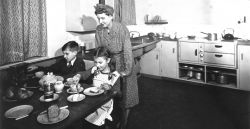Teachers given unique opportunity to develop lessons from rediscovered social surveys
Teachers will be delving into unexplored records of Britain’s domestic history to create their own original learning resources, thanks to a new collaboration between the University of Sussex and The National Archives.
 The Teacher Scholar Programme, funded with a grant from the Economic and Social Research Council (ESRC), will give eight UK school teachers the opportunity to learn about the transition from poverty to affluence in Britain during the 20th century.
The Teacher Scholar Programme, funded with a grant from the Economic and Social Research Council (ESRC), will give eight UK school teachers the opportunity to learn about the transition from poverty to affluence in Britain during the 20th century.
Using the early government-administered household expenditure surveys, they will explore how and why living standards increased and what it meant for ordinary households.
The teachers will carry out their own research into living standards during autumn 2012 and work towards the creation of original learning resources with the assistance of Ben Walsh, history education trainer and author.
Following approval by an editorial board, these resources will be published on The National Archives website and the British Living Standards project website.
The teachers will attend a two-day workshop run by historians and economists from Sussex and record specialists from The National Archives, and will carry out further collaborative work on a study tour of the houses and streets of Liverpool and Manchester.
Dr Samantha Shave, Research Fellow in History at Sussex and project manager of the Teacher Scholar Programme, said: “This is an opportunity for teachers across the UK to engage with new research on living standards.
“It will not only benefit the teachers on the scheme, but also the pupils attending the new lessons. The project will hopefully inspire teachers to use original documents and new datasets to provide nuanced accounts about living in 20th-century Britain.”
The University received the three-year grant in 2010 from the ESRC to digitise and analyse three British household expenditure surveys carried out between 1900 and 1960.
The project directors, historian Professor Ian Gazeley and economist Andrew Newell, believe their work will lead to a better understanding of the precise roles played by the welfare state, self-help, education, family size and improvements in real wages driven by technological progress.
Andrew Newell said: “Everyone knows we became massively better off but nobody knows the details of how prosperity trickled down to working households.”
He added: “The digitisation of the surveys is now complete and we are heavily engaged in cleaning the 1953-54 household expenditure survey, to be ready for the Teacher Scholar Programme and for analysis here at Sussex. The analysis of the earlier surveys is well under way and some of the results have already been published.”
